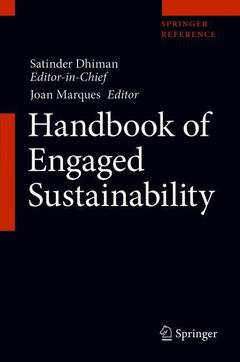Description
Handbook of Engaged Sustainability, 1st ed. 2018
Coordinator: Marques Joan
Editor-in-Chief: Dhiman Satinder
Language: English
Subjects for Handbook of Engaged Sustainability:
Support: Print on demand
Description
/li>Contents
/li>Biography
/li>Comment
/li>
This handbook is based on the premise that in order for sustainability to be sustainable, a profound psychological transformation has to take place at the individual and collective level. Focusing on the practice of environmental sustainability, this handbook will explore the application of sustainability in a wide variety of contemporary contexts?from economics of consumption and growth to government policy, sustainable cities, and sustainable planet. The editors believe that the way to achieve sustainable, harmonious living in all spheres is through lived or engaged sustainability at the personal, team, and organizational levels.
It is impossible to separate economic development issues from environment issues. In its most practical aspect, sustainability is about understanding the interconnections among environment, society, and economy. This book aims to provide a comprehensive overview of current theories and approaches in the area of engaged sustainability for academics, researchers and practitioners. Specifically, it will focus on making responsible decisions that will reduce humanity?s negative impact on the environment. While various social and political initiatives for sustainability are welcome, one cannot really enact sustainability into legislative laws. Something has to change fundamentally at the level of a common person in the street.
The Handbook of Engaged Sustainability acknowledges the classic literature, theories and principles in the area of sustainability, but also provides new theories and approaches from global scholars and practitioners in the field. It will also provide a well-structured pedagogical framework with real life case examples.
The aim of this handbook is to expand the reader?s thinking to one of ?big-picture awareness? and a ?cosmic vision? of sustainability, a vision that extends from our neighborhoods to our communities, to states, countries, globe, galaxy, and envelops the entire Universe! This book will serve as an essential resource for researchers, scholars and students of sustainability, ethics, corporate social responsibility and environmental economics, as well as consultants, business and team leaders, and anyone interested in engaged sustainability.
Satinder Dhiman, PhD, EdD, MBA, MCOM serves as Associate Dean, Chair, and Director of the MBA Program and Professor of Management at Woodbury University’s School of Business. He holds a PhD in Social Sciences from Tilburg University, Netherlands; a Doctorate in Organizational Leadership from Pepperdine University, Los Angeles; an MBA from West Coast University, Los Angeles; and an MCOM (with the gold medal) from the Panjab University, India. He has also completed advanced Executive Leadership programs at Harvard, Stanford, and Wharton.
Professor Dhiman teaches courses pertaining to ethical leadership, sustainability, organizational behavior & strategy, and spirituality in the workplace in the MBA program. He has authored, co-authored, and co-edited over 17 management, leadership, and accounting related books and research monographs, including, most recently authoring: Holistic Leadership(Palgrave 2017); Gandhi and Leadership (Palgrave 2015), and Seven Habits of Highly Fulfilled People(Personhood 2012); and co-editing and co-authoring, with Dr. Marques, Spirituality and Sustainability (Springer 2016) & Leadership Today (Springer 2016).
He is the Editor-in-Chief of two multi-author Major Reference Works: Springer Handbook of Engaged Sustainability and Palgrave Handbook of Workplace Spirituality and Fulfillment and Editor-in-Chief of Palgrave Studies in Workplace Spirituality and Fulfillmentand editor Springer Series in Management, Change, Strategy and Positive Leadership. Some of his forthcoming titles include: Leading without Power: A New Model of Highly Fulfilled Leaders; Bhagavad Gītā: A Catalyst for Organizational Transformation(both by Palgrave MacMillan);and Conscious Consumption: Diet, Sustainability and Wellbeing (Routledge, 2019).
Recipient of s
First book on engagement to improved sustainability
Insights into the interconnections between environment, society and economy and the socio-ethical basis of sustainability
With multidisciplinary contributions from experts from around the world
Combines classical literature and theories with new frameworks, theories and examples from practice
These books may interest you

Handbook of Sustainable Travel 105.49 €

Handbook of Sustainable Travel 105.49 €


